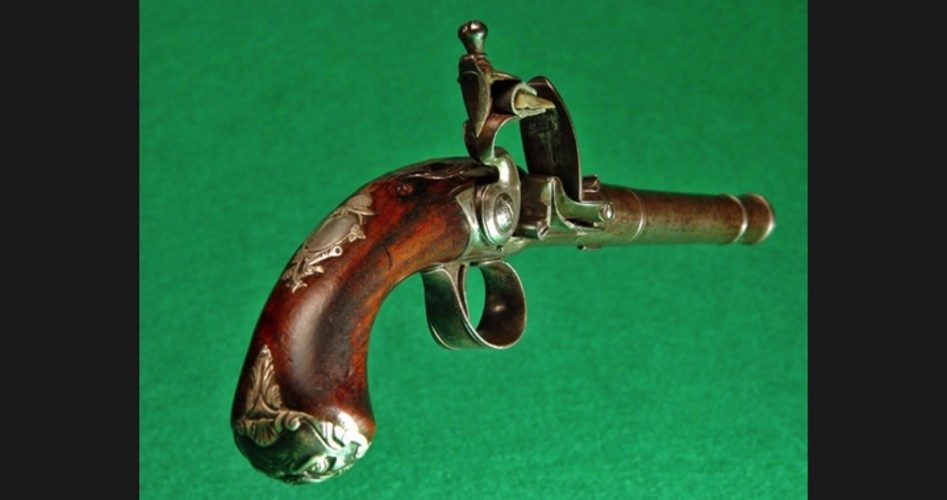
After a flurry of protests brought attention to New Jersey’s draconian restrictions on possession of firearms, retired schoolteacher George Van Gilder will not be facing trial for his possession of an 18th-century flintlock pistol.
As reported previously for The New American, Van Gilder was arrested the day after a routine traffic stop brought his possession of the antique firearm to the attention of law enforcement. Van Gilder was a passenger in a vehicle that was pulled over in a neighborhood characterized by police as “known for illegal drug activity.” Van Gilder disclosed the presence of the antique when a deputy inquired whether there was anything “dangerous” in the vehicle. The officers did not arrest Van Gilder during the traffic stop, but the following day four officers arrived at his house to take him into custody. In Van Gilder’s words: “One of the undersheriffs said, ‘Well, let him go, it’s 250 years old.’ But his boss, who is the sheriff, said, ‘No, we have to arrest him.’ Next morning, I am sleeping and I hear big pounding on the door, and four of them came and took me away with three or four sheriff’s cars — I guess they didn’t have anything better to do with taxpayers’ money, by the way.” Authorities threatened Van Gilder with prosecution under a felony charge, which would have necessitated a minimum of 3.5 years in prison, with a maximum sentence of 10 years.
According to Van Gilder and the driver of the car, Adam Puttergill, the two men were in the process of returning to Van Gilder’s home after travelling to a pawn shop to acquire the 18th-century antique. According to press reports, Van Gilder does not drive on account of his severe arthritis.
The antique pistol is remarkable for its age and value. The 1760 Queen Anne flintlock (example of Queen Anne flintlock shown) was of a type commonly used during America’s Revolutionary War, providing a poignant irony to the attempt by local officials to violate Van Gilder’s second-amendment liberties. Under federal law and the laws of most states, the antique is exempt from classification as a firearm. However, New Jersey’s laws pointedly do not exempt antiques from its unconstitutional restrictions on the right of citizens to possess firearms.
When the circumstances of Van Gilder’s arrest brought international attention to the case, Cumberland County Prosecutor Jennifer Webb-McRae announced that the state would exercise “prosecutorial discretion to dismiss” the charge against Van Gilder. However, Webb-McRae did not pass up the opportunity to threaten members of the public with prosecution if such a situation were to arise on some future occasion: in the prosecutor’s words, “the public should be forewarned about the prescriptions against possessing a firearm — even an antique — in a vehicle.”
Van Gilder’s attorney highlighted the absurdity of the state’s claims regarding the antique flintlock. Attorney Evan Nappen observed, “He [Van Gilder] doesn’t even consider it a gun, he thinks of it as another piece of 18th century Americana. My client has never fired it, nor would he want to fire it. You’d be foolish to shoot it. There may be metallurgical issues … and it could blow up in your hand, You’d have to be a fool to shoot it.” Which, presumably, is the reason why the prosecutor’s office initially declared their intention to perform ballistics tests on the pistol.
Prior to the prosecutor’s decision not to pursue charges against Van Gilder, the sheriff’s office engaged in what Nappen describes as a “smear campaign.” As reported in the press, “Cumberland County Sheriff Robert Austino later said his officers pulled the two over because they were in a suspicious neighborhood known for illegal drug activity. While talking to the two, officers at the scene discovered empty heroin bags and a broken scale used for measuring drugs, Austino said.”
However, despite the sheriff’s prejudicial claims, neither Van Gilder nor Puttergill were charged with possession of heroin or drug paraphernalia. Puttergill was arrested on an outstanding contempt warrant, and was initially charged “with possessing two prescription pills that were not in their pharmacy container. The drug charge has since been handled by Puttergill’s attorney in Millville Municipal Court, resulting in a conditional discharge of the charge.” In short, all claims by the sheriff’s office pertaining to heroin possession completely evaporated.
When prejudicial claims are released to the press while prosecutors weigh putting a man on trial for exercising a fundamental constitutionally protected liberty, questions arise regarding the state of the republic established on this continent in the days immediately following the manufacture of Van Gilder’s Queen Anne pistol.
Related article:



